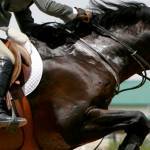Feeding After Exercise: Effect on Glucose and Glycogen Responses in Horses

Carbohydrates, especially muscle glycogen, are key sources of energy for working muscle. When muscle glycogen is depleted during exercise, fatigue occurs rapidly.
Because glycogen is a valuable energy substrate during exercise, replenishment of its stores is extremely important. Diets high in soluble carbohydrate should have a positive effect on muscle glycogen repletion, but some studies have noted that glycogen resynthesis in horses is slow even when high-grain diets are fed. If repletion to pre-exercise levels does not occur, subsequent performances may be negatively affected. In humans, feeding carbohydrates soon after exercise affects the uptake of glucose by muscle and increases the synthesis of muscle glycogen as compared to feeding a carbohydrate source several hours after exercise. Typically, horses are not fed the grain portion (soluble carbohydrate source) of the diet during the early (< 1.5 hours) post-exercise (PE) period. However, feeding the grain meal closer to the end of exercise may be more beneficial for the horse, if muscle glycogen resynthesis can be effected. Enhanced glycogen resynthesis after exercise could be important for horses that compete on consecutive days, such as three-day eventers.
In a study conducted at the University of Kentucky, four conditioned Thoroughbred geldings were used in a 4×4 Latin square experiment to determine the effect of feeding a carbohydrate source during the early or late PE period on blood glucose and muscle glycogen responses. In each collection period, three horses were exercised for 1 hour and one horse served as an unexercised control. Each exercised horse received a meal of oats at a different time PE: 1.5 hours PE, 4 hours PE, or divided into two smaller meals at 1.5 and 4 hours PE. The unexercised control horse received a meal of oats at a similar time of day as the exercised horses. Venous blood samples were taken every 30 minutes for 6 hours after consumption of the test meal. Blood samples were analyzed for plasma glucose and serum insulin. Muscle biopsies were taken at rest, after exercise, prior to feeding, 6 hours after feeding, and 26 hours after the initial biopsy.
Exercised horses had lower peak glucose and insulin concentrations post-feeding than the controls. These results suggest that exercise has a residual effect on the horse that produces altered glucose and insulin responses to a meal. In humans, exercise is known to have an effect on glucose transport into muscle, and the same effect may occur in the horse. Feeding at different times after exercise also affected glucose and insulin responses. When the horses were fed 4 hours PE they had lower insulin concentrations, lower plasma glucose peak, and a slower glucose clearance rate than when they were fed 1.5 hours PE. The exercise test resulted in limited glycogen depletion. Muscle glycogen concentrations were lower at 4 hours PE as compared to immediately after exercise or 1.5 hours PE. At 6 hours post-feeding, glycogen concentrations continued to be lower in horses fed 4 hours PE than in horses fed 1.5 hours PE.
The results from this experiment suggest that feeding 1.5 hours PE, as opposed to 4 hours PE, prevents the further depletion of muscle glycogen stores. Although there were some differences in glucose metabolism, time of feeding after exercise did not affect the muscle glycogen concentrations in biopsies obtained 26 hours PE. The absence of an effect was possibly related to the low level of glycogen depletion produced by the exercise test. Even though the horses worked over a distance of 18 km, the work intensity was minimal. A more strenuous test that produces more severe glycogen depletion should be used in subsequent studies to evaluate the effect of the feeding program on muscle glycogen resynthesis in the horse.
This paper was first published in “Recent Advances in Equine Nutrition,” Proceedings for the 1995 KER Short Course for Feed Manufacturers.








